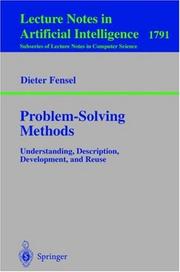| Listing 1 - 1 of 1 |
Sort by
|

ISBN: 3540678166 3540449361 Year: 2000 Publisher: New York, NY ; Berlin : Springer-Verlag,
Abstract | Keywords | Export | Availability | Bookmark
 Loading...
Loading...Choose an application
- Reference Manager
- EndNote
- RefWorks (Direct export to RefWorks)
Researchers in Artificial Intelligence have traditionally been classified into two categories: the “neaties” and the “scruffies”. According to the scruffies, the neaties concentrate on building elegant formal frameworks, whose properties are beautifully expressed by means of definitions, lemmas, and theorems, but which are of little or no use when tackling real-world problems. The scruffies are described (by the neaties) as those researchers who build superficially impressive systems that may perform extremely well on one particular case study, but whose properties and underlying theories are hidden in their implementation, if they exist at all. As a life-long, non-card-carrying scruffy, I was naturally a bit suspicious when I first started collaborating with Dieter Fensel, whose work bears all the formal hallmarks of a true neaty. Even more alarming, his primary research goal was to provide sound, formal foundations to the area of knowledge-based systems, a traditional stronghold of the scruffies - one of whom had famously declared it “an art”, thus attempting to place it outside the range of the neaties (and to a large extent succeeding in doing so).
Expert systems (Computer science) --- Problem solving --- Computer Science --- Engineering & Applied Sciences --- Problem solving. --- Knowledge-based systems (Computer science) --- Systems, Expert (Computer science) --- Computer science. --- Software engineering. --- Artificial intelligence. --- Computer Science. --- Artificial Intelligence (incl. Robotics). --- Software Engineering. --- Methodology --- Psychology --- Decision making --- Executive functions (Neuropsychology) --- Artificial intelligence --- Computer systems --- Soft computing --- Artificial Intelligence. --- AI (Artificial intelligence) --- Artificial thinking --- Electronic brains --- Intellectronics --- Intelligence, Artificial --- Intelligent machines --- Machine intelligence --- Thinking, Artificial --- Bionics --- Cognitive science --- Digital computer simulation --- Electronic data processing --- Logic machines --- Machine theory --- Self-organizing systems --- Simulation methods --- Fifth generation computers --- Neural computers --- Computer software engineering --- Engineering
| Listing 1 - 1 of 1 |
Sort by
|

 Search
Search Feedback
Feedback About UniCat
About UniCat  Help
Help News
News